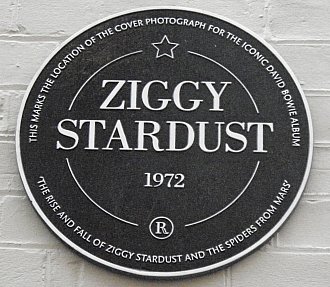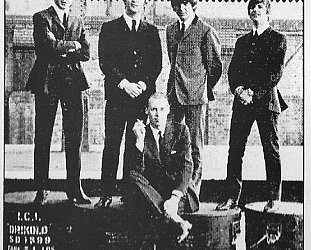Graham Reid | | 3 min read
David Bowie: Starman

Judging by the indifference of people in swanky Heddon Street just off London's Regent St, no one had read the wall plaque I was photographing.
In London there are plaques everywhere commemorating something or other, so the nonchalance was expected.
But the cool people's interest wasn't even piqued when my son and I started striking odd leg-up poses.
Heddon Street was where – 40 years ago on a dank January night – David Bowie got a leg up and posed for the cover of his classic album The Rise and Fall of Ziggy Stardust and the Spiders From Mars.

That left Bowie to pose -- in a jumpsuit, booted leg up on step -- under watery light.
Back then this street was just a small lane, today it is home to fashionable bars and outdoor dining (right).
Ward shot in black and white but the photo was then hand-coloured by Terry Pastor – Bowie's jumpsuit blue, the atmosphere slightly bilious and hungover – to unwittingly create an iconic rock image.
 The plaque now acknowledges
the site of the photo.
The plaque now acknowledges
the site of the photo.
The cover didn't sell the album, but the concept and music certainly did.
A Richard Cromelin noted in his Rolling Stone review at the time, Ziggy Stardust was “Bowie's most thematically ambitious, musically coherent album to date, the record in which he units the major strengths of his previous work . . .”
In its mash-up of Velvet Underground angst (whom he had long admired, later that year he would produce Lou Reed's Transformer), glam rock, dramatic pop, ambiguous sexuality and the concept of a starman coming to Earth with an apocalyptic warning, Bowie finally became the superstar he had longed to be.
As British reviewer Michael Watts said, "Bowie's bid for stardom is accelerating at lightning speed”.
It had been a while in coming. Previously he'd been a fashion-chasing young Mod in the mid Sixties, tried his hand at rhythm and blues, stage work and mime, got lucky with A Space Oddity which captured the mood of the moon landing times, done post-Dylan hippie pop, referenced Andy Warhol and flirted as a bisexual glam rocker. In retrospect it all seems slightly desperate, but Ziggy Stardust leaped into the world as fully formed album, and character whom he adopted.
 The concept was
clever – some songs are third person and others by Ziggy, the live
band on stage sharing their name with that on the album – so
multiple interpretations immediately took hold. Timothy White of
Billboard likened it to Franz Kafka.
The concept was
clever – some songs are third person and others by Ziggy, the live
band on stage sharing their name with that on the album – so
multiple interpretations immediately took hold. Timothy White of
Billboard likened it to Franz Kafka.
When Gary Kemp of Bowie acolytes Spandau Ballet unveiled the plaque (Bowie conspicuously absent) he said, “Ziggy was the ultimate messianic rock star and with him David Bowie successfully blurred the lines, not just between boys and girls, but himself and his creation”.
True. Bowie insisted journalists call him Ziggy although within a year as he toured constantly (America infuriatingly immune to his charms and the album early on, influential critic Lester Bangs insisting the whole Ziggy thing a fluke) it all became too weird.
“That fucker wouldn't leave me alone for years,” he said later. “That was when it all started to sour. My whole personality was affected. It became very dangerous. I really did have doubts about my sanity.”
Fortunately he'd written a way out in the final song Rock and Roll Suicide and almost a year to the day after the album's release he pulled the plug at the Hammersmith Odeon, leaving a generation of orange-haired sexually bewildered kids even more confused.
Given Ziggy was such a creation of its maker and the era – high concept glam, fashion, buzz-cut hair and role play – it's remarkable the album doesn't feel like a slightly-soiled period piece. The quality of the songs – brittle, tender, abrasive, and chock full of hooks, drama and allusive lyrics – has given it longevity.
 David Fricke of
Rolling Stone recently observed it was “a marvel of genetic pop
engineering, a brilliant and authentic collision of classic rock and
roll extremes – erotic frenzy, gender confusion, celebrity
arrogance, private dread – animated by the ring of truth in Bowie's
scenarios of apocalyptic fear and the futurist punk snort of the
Spiders from Mars.”
David Fricke of
Rolling Stone recently observed it was “a marvel of genetic pop
engineering, a brilliant and authentic collision of classic rock and
roll extremes – erotic frenzy, gender confusion, celebrity
arrogance, private dread – animated by the ring of truth in Bowie's
scenarios of apocalyptic fear and the futurist punk snort of the
Spiders from Mars.”
The remastered 40th anniversary reissue – of an album reissued many times previously – comes with no extra tracks. It doesn't need them.
As a song cycle it is, as Roy Carr and Charles Shaar Murray wrote 30 years ago, “the definitive rock and roll concept album, and by far the most cogent commentary an rock artist has ever made on his own art form”.
Ziggy Stardust is an irresistible and essential rock album, and the cover is kinda cool too.
There is more about David Bowie's long career -- including interviews -- at Elsewhere starting here.





post a comment